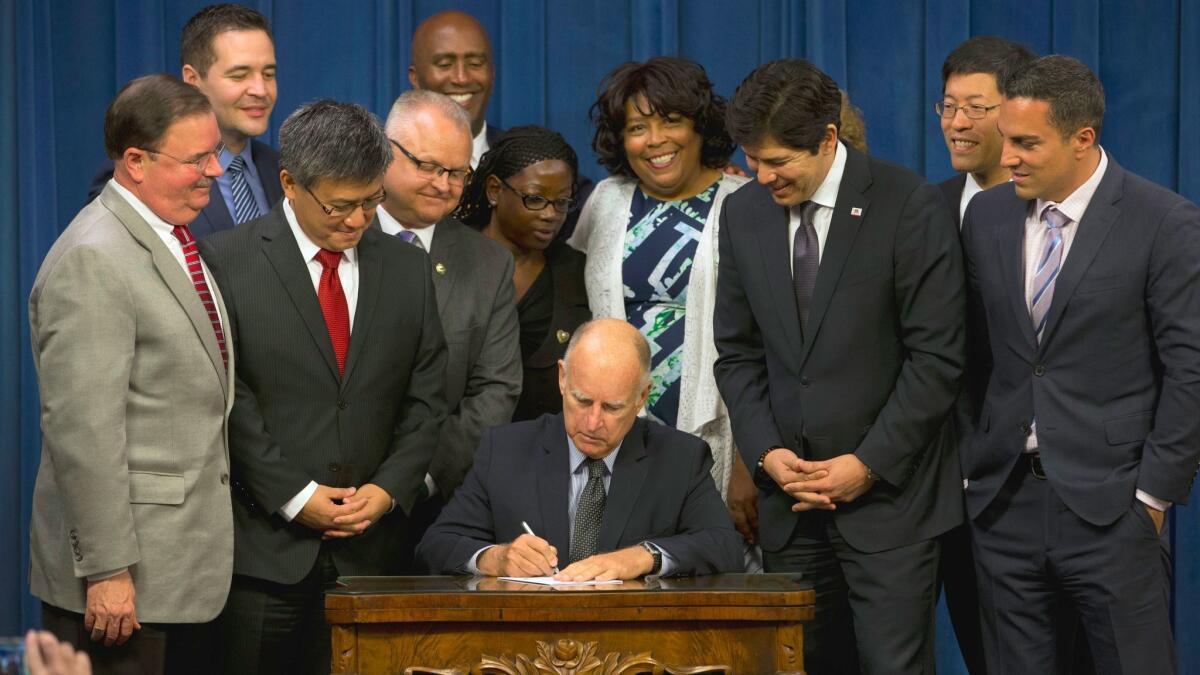Editorial: Will the Senate sacrifice a savings plan for low-income workers on the altar of Wall Street?

- Share via
The U.S. Senate is poised to kill efforts by California and a number of other states to keep more seniors out of poverty — because Wall Street mutual funds want it to. Senators who vote to put the needs of Fidelity and Vanguard ahead of their constituents’ should go home and explain why the government shouldn’t help low-income workers build up their scant retirement savings.
At issue are two rules issued by the Department of Labor last year that create a clear legal pathway for state and local governments to offer a new type of retirement savings plan. Epitomized by California’s “Secure Choice,” the plans require employers that do not offer a pension, 401(k) or other retirement benefit to enroll their workers automatically in an Individual Retirement Account unless the workers opt out. For those who chose to stay in the plan, a small percentage of their pretax wages would be deposited into an account that would grow tax free (until withdrawn) and follow them whenever they changed jobs. Secure Choice is a great idea, refined through years of work by Senate President Pro Tem Kevin de León (D-Los Angeles) and various stakeholders.
Nevertheless, GOP opponents of the rules have pushed resolutions through the House to rescind the rules, and the Senate is expected to vote on the resolutions as soon as Wednesday. These lawmakers claim that they’re trying to protect workers against risky retirement plans not protected by the federal law governing pensions and 401(k) plans, while also shielding taxpayers from any losses run up by government-sponsored IRAs. Both arguments are nonsense and transparently so, at least as far as California’s program is concerned.
Secure Choice participants will have more protection than those who invest in workplace 401(k) plans because a state board will scrutinize the administrative costs and investment performance of the companies that handle workers’ IRAs — something that doesn’t happen with 401(k)s. And under the law that created Secure Choice, California taxpayers would have no liability for the costs or the investment returns.
Opponents of the rule are wrapped up in an ideological straightjacket that rejects any government action to help people whom private companies could serve.
Wall Street mutual fund companies do not like the idea of the government offering a retirement product to consumers they’re making no real effort to serve. But that’s whose retirement security is at stake — 55 million Americans, including an estimated 7.5 million in California, whose employers don’t offer retirement plans. The state estimates that two-thirds of these people work for small businesses that either aren’t capable or not interested in taking the trouble to establish pension or 401(k) plans.
And these folks typically have little or nothing saved for retirement. The Economic Policy Institute estimated last year that half of American families with workers in their prime had $17,000 or less in savings. And too many U.S. seniors — at least 10 % — already are living in poverty. That’s why programs like Secure Choice, which automatically funnel money from workers’ paychecks into IRAs, are so important. According to Utah State Treasurer David D. Damschen, workers not covered by an employer plan are 15 times more likely to save for retirement if they can do so through an automatic payroll deduction than if they have to establish and contribute to an IRA on their own.
The Labor Department rules made clear that the state-sponsored IRAs would be exempt from the federal law on employer plans, and appropriately so. Employers shouldn’t be liable for anything but signing their workers up for the plans and making sure their payroll deductions are handled properly. But opponents of the rules don’t really object to the department’s reasoning; instead, they’re wrapped up in an ideological straightjacket that rejects any government action to help people whom private companies could serve, even if they have clearly failed to do so.
Bear in mind that the money invested through Secure Choice would still be placed in funds managed by the private sector. And nothing would prevent mutual fund companies from competing with state IRAs for customers — they just haven’t been interested in those employers or their workers.
Damschen, a Republican, sent an impassioned plea last week to his state’s senior senator and fellow Republican, Finance Committee Chairman Orrin Hatch, in favor of the rule regarding state savings programs, noting that it was promulgated at the states’ request. “Unlike so many federal regulations,” he wrote, “this rule empowered states to innovate in the interest of their constituents’ retirement security. Establishment of this rule was Washington at its best, enacting in a positive way the principle of federalism embodied in the 10th amendment to our Constitution.”
And it’s more than just Republican principles at stake. There’s also the potential tax dollars that states will have to spend on seniors who fall below the poverty line after they stop working. Utah alone will spend more than $3.7 billion on new retirees over the next 15 years, Damschen wrote, the majority of it “on the one-third of our constituents who are least prepared financially for retirement.”
His argument appears to have fallen on deaf ears, unfortunately; Hatch has introduced resolutions identical to the ones passed by the House. But the rest of the Senate should listen, and put Wall Street’s interests behind those of less fortunate working men and women.
Follow the Opinion section on Twitter @latimesopinionand Facebook
More to Read
A cure for the common opinion
Get thought-provoking perspectives with our weekly newsletter.
You may occasionally receive promotional content from the Los Angeles Times.









